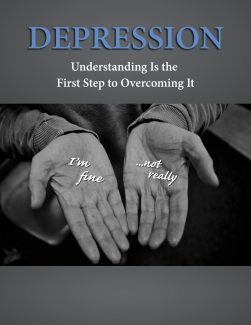
 License Type: Private Label Rights
License Type: Private Label Rights  File Type: ZIP
File Type: ZIP
 SKU: 61173
SKU: 61173  Shipping: Online Download
Shipping: Online Download
Sample Content Preview
Depression 101: Understanding It Is the First Step to Overcoming It
If you or someone you know has suddenly lost interest in the things they normally love, has trouble sleeping, or sleeps too much, there is a possibility that it’s depression. Sometimes depression is subtle, and sometimes it can be in your face. The main thing to note is that if you’re feeling hopeless, sad, and empty for more than two weeks, you probably are suffering from depression. Thankfully, depression is very treatable.
Major depression affects more than 7 percent of the US population. Sadly, most of the people suffering don’t know that they’re suffering and don’t seek the appropriate help. Usually, the reasons for not getting help involve not having the right insurance, not being able to afford the care, or not accepting that they have a problem because it’s considered a made-up problem by their circle of family and friends.
Since depression is a treatable disorder, this is sad. If you do seek treatment, you’re a strong person who can recover. Don’t allow the stigma or even money stand in your way. There are often places that can help you, regardless of your financial abilities. You’ll be glad you did.
The Difference between Depression and a Low Mood
Everyone experiences stressful times and low mood occasionally. Usually, this is related to an event in life such as working too long hours, or a tragedy that you’re coping with. But these types of low moods usually pass eventually. When a low mood doesn’t pass, usually within about two weeks, or you cannot identify why you’re feeling bad, then you may be suffering from depression.
In addition, there are other illnesses that you can have that manifest as low moods, such as thyroid disorders, low vitamin D3 levels in the blood, and even anxiety. It’s imperative that you seek professional diagnosis to ensure that what you really have is depression before you try to treat your condition.
Remember that sadness like other feelings is a valid, human emotion. Everyone who feels low is not depressed. When you’re sad, it’s likely that someone can still make you happy, or you can listen to happy music, or do your favorite hobby and feel better. But, when you are depressed you cannot find joy in even the things that used to give you joy, no matter what they are.
Depression may happen even at the happiest time of your life because it has nothing to do with outward events. While it’s true that sometimes depression can be triggered by a normal life event that you’re having trouble accepting and getting over, usually it just happens for what seems like no reason. It’s not different from getting another disease such as diabetes. It has a physiological reason for happening even if we’re not totally sure yet what causes it, but it has a treatment that can help you manage it or cure it.
When you are depressed, you cannot just snap out of it. You can’t just listen to a happy song, play with your kids, go for a walk, read positive things, or write a journal and expect it to magically go away.
Types of Depression
There are many different types of depression. If your symptoms have persisted for a long time, be honest with your doctor about them. Don’t leave anything out. Even if you’re not sure it’s related to your disorder, you want to tell the truth and be honest so that you can be properly diagnosed and treated.
* Major Depression – Usually there is a combination of symptoms that have lasted for two weeks or longer. These symptoms interfere with your ability to enjoy everyday life, even when you loved them before. You may feel empty, moody, hopeless, pessimistic, worthless and more. You may even have thoughts of suicide or have attempted suicide.
* Dysthymia – If someone has depression for more than two years without it lifting, it’s considered chronic. It’s not different from major depression but you may have to be treated longer (if not for a lifetime) if you are diagnosed with dysthymia.
* Persistent Depressive Disorder - Some people are depressed for a long time, over two years, but it comes and goes. Some days you’re able to be happy, but the depression comes back. This differs from bipolar in that you don’t have manic episodes, just times of normalcy.
* Bipolar Disorder – There are many types of bipolar disorder that also involve depression. But often it includes manic episodes where you feel on top of the world, and then you plunge into a depression that seems to have no end.
- Total Downloads:1
- License: Private Label Rights
- Category:Ebooks
- Tags:2017 Ebooks Private Label Rights







